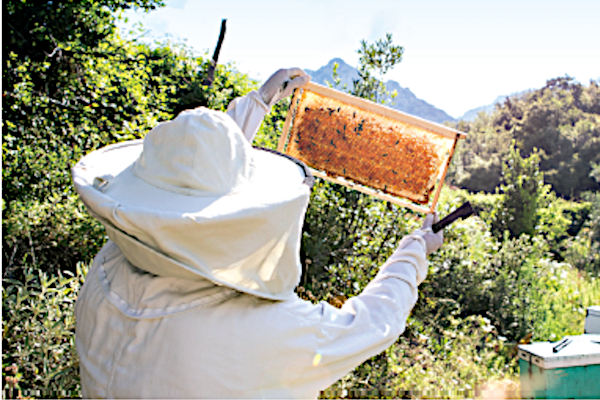
On Friday 07.10.2022 an article about the challenges in the organic beekeeping was published in Agro.Tec magazine. The article was written by Mrs. Lina Lasithiotaki M.Sc and coordinator of the Institute for Ecological Agriculture DIO. Many thanks to Agro.Tec magazine for the cooperation, editing and publication of the text.
A promising agricultural activity in our country is organic beekeeping, which applies a series of practices aimed at both the production of a superior quality product and the well-being of the bees.
Written by Ms Lina Lasithiotaki, agronomist, M.Sc, Institute for Ecological Agriculture
Institute for Ecological Agriculture DIO has been present in the field of primary production for more than 20 years and its members are agronomists, farmers, scientists, growers and beekeepers. Considering organic beekeeping of the highest importance and wanting to emphasize not only its importance but also the difficulties in its practice, Institute for Ecological Agriculture DIO, wrote a letter to the Minister of Rural Development and Food (on April 26, 2021), which has been published on the website (www.insteco.gr) of the Institute, in the magazine ‘Beekeeping inspection’ as well as in other electronic and printed media.
In this particular letter, we pointed out our proposals˙ one of those was to include organic beekeeping in the upcoming financial assistance program.
After the submission of our proposals and the continuous pressure that we applied on the relevant bodies throughout the period of interest, organic beekeeping was finally included in the agriculture activities to be given financial support.
Specifically, in the context of actions 11.1.2 and 11.2.2 of measure 11 ‘Organic Agriculture’ of the Rural Development Program 2014-2020, 50.5 million euros will be given to 3.017 beneficiary beekeepers for occupied hives. The obligations of the beneficiaries begin on the date of issuance of the decision on the inclusion of deeds and last for a period of three years.
This year’s program is an opportunity to create and grow a healthy and sustainable organic beekeeping. It is also a prime opportunity to incentivize conventional beekeepers to learn about organic beekeeping since the certification costs will be covered by the program.
Agro.Tec
SUGGESTIONS FOR NEW BEEKEEPERS
One of the biggest challenges for beekeepers, when it comes to converting into organic farming, will be finding organic wax and replacing the conventional wax in the hives with the organic one, as the replacement period is ‘dead’ productive year. Now, the legislation requires a full replacement in the first year and our proposal, is to replace the organic wax gradually over a three-year period, something we assume as feasible.
With the subsidy’s support, at the end of three years we will have beekeepers who will have been trained in organic wax and they will be able to decide, whether they continue its production or not, without the need of the subsidy in order to be independent. In this way, unfair competition is avoided against the old organic beekeepers and against the conventional beekeepers.
At the same time, there is possibility of studying the wax analyses carried out by The Organic Beekeepers Association of Greece, in order to co-authorize bodies to submit their substantiated proposals taking always into consideration the differentiated regime applicable to wax in other European countries. In addition, minimum limits should be set for specific active substances (limits 0.1 or 0.50 mg/kg, etc.) so that they apply the same throughout the E.U.
During the three-year period, the sale of the organic wax should be accompanied by an analysis (with the above criteria) so that there is an incentive to accredit the laboratories concerned with the wax. Furthermore, the cost and the time of publication of results should be reduced.
LACK OF ORGANIC WAX
Another challenge is the lack of organic wax on the market. The existing wax either is found in small quantities or is intended for beekeepers’ own use. The amount that can be provided from abroad is small and not enough to meet the needs of beekeepers, while at the same time it has very high cost.
Standard analyses to detect residues above established limits are very common, which translates into placing on the market ‘clean’ – acceptable wax with zero residues.
Concerning the materials used in the hives, we believe that since the whole subsidy program has environmental spirit, the use of plastic hive bases (with special and specific specifications) it is likely to be a good and friendly to the environment choice. This would be a likely good solution in comparison with the wooden bases, which may, due to their potentially non-ecological management practices (impregnation with chemicals), have an ecological footprint, burden the beehive and make work of bees difficult in dealing with enemies and diseases.
In general, we appreciate that the use of plastic parts, as long as the meet all the safety standards for the collected bee-food products, do not impose any burden on the final produced product.
MEETING WITH THE DEPUTY MINISTER
In this context, representatives of the Institute for Ecological Agriculture and DIO – INSPECTION & CERTIFICATION ORGANIZATION OF ORGANIC PRODUCTS, participated together with other bodies in the meeting with the Deputy Minister of Rural Development and Food, Mr Simos Kedikoglou on September 5th, 2022. During the meeting, there was an exchange of views focused on the problems that concern the sector today, mainly ensuring
compliance with the rules that govern the control mechanisms and the establishment of permissible limits o residue in the wax, which will certify the organic origin of the honey.
In particular, regarding to the issue of residues, the need to set the limits was emphasized in order to ensure the organic value of honey on the one hand and to prevent unfair competition with similar cases in other European countries in which higher ‘national’ limits have been established in relation to them on the other defined by the Regulation.
As regards the control and certification system, the representatives of Association of Organic Beekeepers raised the question of the adequacy of staff to the Hellenic Organization ‘Demetra’ and to the certification bodies. They demanded the controls to be carried out as defined from the Regulation, so that criteria for the number of inspection per inspector will be set especially for beekeeping, in order to have specialized technical competence.
The certification of organic Greek honey can be a ‘ticket’ for its export all over the world
The Deputy Minister explained that there is a clear will to find the right solutions for organic beekeeping but also for the beekeeping sector, in general.
CERTIFICATIONS
Because the organic bee products have many benefits for consumers’ health, organic beekeeping is considered as an extremely important factor in maintaining and increasing biodiversity of the Greek ecosystem, acting as a guardian of the sustainable development with zero ecological footprint.
The certification of organic Greek honey can be a ‘ticket’ for its export all over the world. In the period of the economic, health and energy crisis, the demand and the exports of organic honey and the other bee products, are on the rise. Organic beekeepers hold in their hands a very important product of Greek nutrition and tradition, which has worldwide recognition. Bees produce a variety of products of high nutritional value, such as pollen, royal, jelly, beeswax, venom and propolis.
Beekeepers collect a multitude of products of high nutritional value and recognition, which combined with the added value of organic certification, can offer them a significant position in the global market.
PREREQUISITES
The first step for organic honey certification is the registration of the business, individual or processor to a control body, which verifies that each beekeeper acts according to the (EU) Regulation 2018/848 and complies with the conditions of organic production.
The text is published in Agro.Tec magazine, in the September – October 2022 issue, No 07, page 44 – 45.


